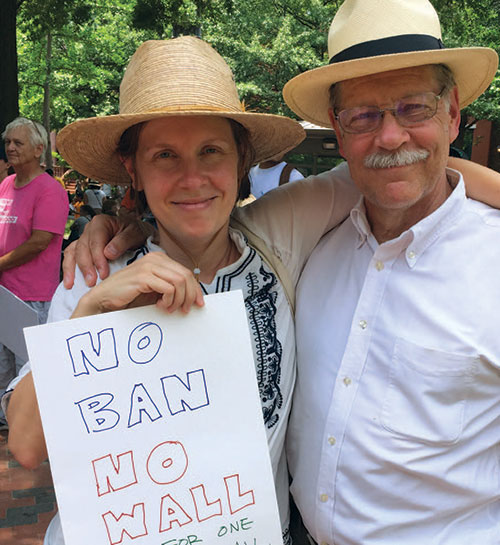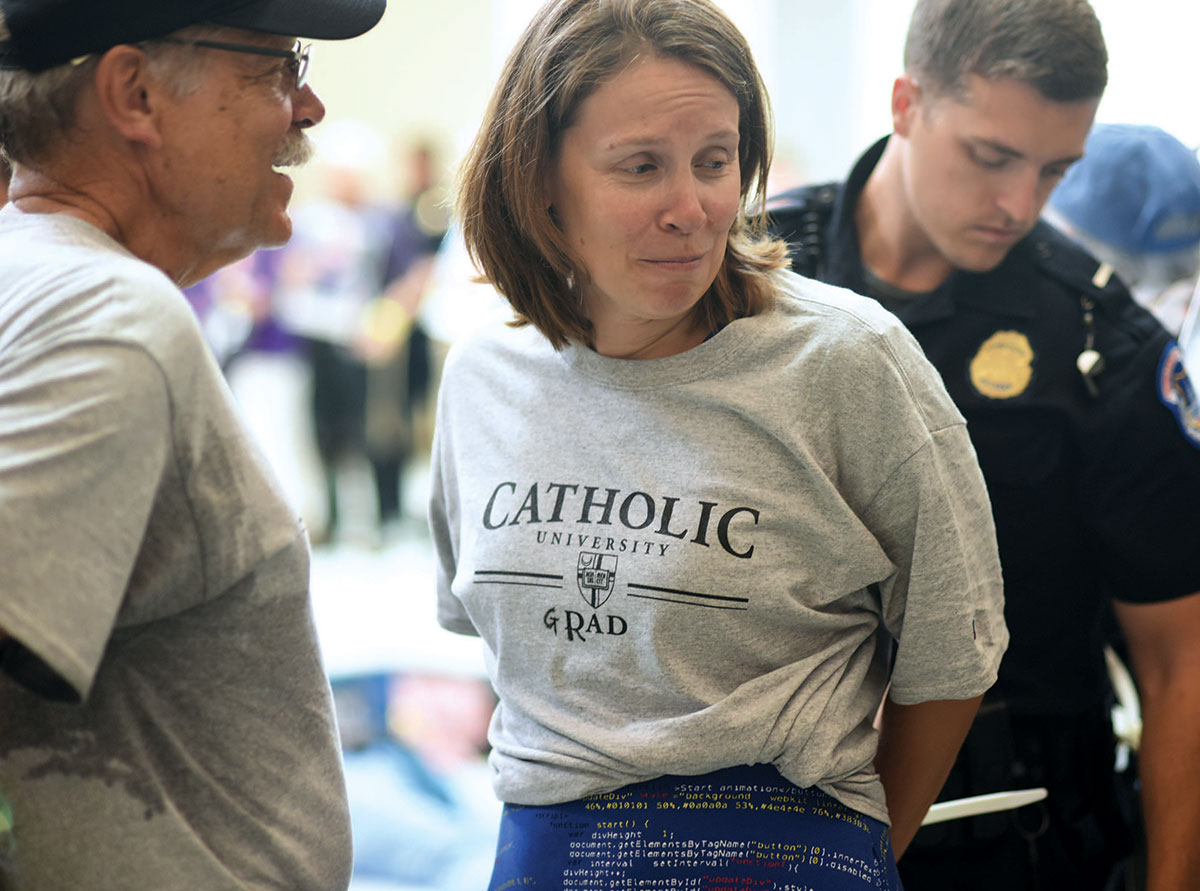
By Julia Young, B.A. 2001

Growing up, I knew I could count on my father to be supportive of almost everything I attempted, from trying out for the basketball team, to singing (badly) in the school musical, to backpacking around Mexico at the age of 18.
Still, I was a bit surprised when he agreed to get arrested with me last summer.
Here’s the backstory: I’m an associate professor of history at Catholic University, where I teach, write, and conduct research about immigration from Latin America to the United States. (I’m also a graduate of the class of 2001, and my mother, Robin Darling Young, is an associate professor of Theology and Religious Studies.) I have long believed that our immigration system is broken, and I have frequently felt called to advocate for immigrants, especially asylum seekers who are trying to escape horrific conditions in their home countries and find freedom and peace here in the United States.
My father, Malcolm Young, J.D. 1974, is a lawyer and lifelong advocate for criminal justice reform. In the last several years, the number of immigrants detained by U.S. Immigration and Customs Enforcement, commonly called ICE, has skyrocketed, and even more notably, the government has begun detaining immigrant children and their parents. Even though my father didn’t work with immigration issues for most of his career, our work has converged.
In July 2019, I found out about a protest called “A Catholic Day of Action for Immigrant Children.” Organized by a coalition of groups including the Conference of Major Superiors of Men, Faith in Public Life, and the Sisters of Mercy of the Americas, among many others, the day included a protest at the U.S. Capitol against the treatment of detained immigrant children and — for those who chose to participate — a planned act of civil disobedience. I had never been arrested before, but I felt deeply moved to show solidarity with immigrants, and to stand with other Catholics (including a group from Catholic University), in the city that is my home. When I called my dad to ask if he’d like to join, he didn’t hesitate. “I’m in,” he said, and that was that.
More than 200 people gathered for the protest. The group first prayed and sang outside of the Russell Senate Office Building, and then filed in to the building’s rotunda, where those who chose to be arrested formed a circle around a smaller group of demonstrators who lay down in the shape of the cross, holding pictures of migrant children on their chests. Our arrest — which resulted in a few hours of detention and a misdemeanor charge of “crowding, obstructing, or incommoding” — was a small but potent way for us to stand in solidarity with immigrants in detention at the border. It was inspiring, too, to see so many Catholics — including elderly nuns, young activists, and clergy — come together around the cause of immigration. After it was over, my father and I both wanted to continue to work to raise awareness and assist immigrant families.

Julia and Malcolm Young are arrested for a “planned act of civil disobedience” during the July 2019 Catholic Day of Action for Immigrant Children.
When I had the chance to join a team of volunteers and work with the Dilley Pro Bono Project (DPBP) at the South Texas Family Residential Center in Dilley, Texas, I jumped at the opportunity to serve as a Spanish-language interpreter. Once again, I called my father to see if he’d be willing to join and volunteer his legal expertise — and once again, he didn’t hesitate.
In Dilley, we worked alongside DPBP staff to help prepare detained immigrant women and children for Credible Fear Screening — one of the many legal hurdles they must pass while seeking asylum in the United States. During that week in late October 2019, we spoke at length with six women, each of whom was accompanied by at least one child. Each woman had a harrowing life story, and many legitimate reasons for fleeing her country and being terrified that she or her children would be killed upon return. They came from regions in Mexico or Central America where narcotrafficking and gang violence are rampant, domestic violence goes unpunished, and people are routinely targeted for their political activism, ethnicity, and religious beliefs. Some of the women were so traumatized and fearful that it took them days to tell their stories.
My father and I were especially moved by the children and babies we met in the detention center. These children were beautiful, sweet, funny, and smart. And they were completely innocent. Not one of them could have truly understood why they were in jail, suspended through no fault of their own between the terror of life in their home countries and the hope of starting life anew.
Despite all these challenges, the children were remarkably mature and well behaved. I’ll never forget watching one five-year-old boy gently take his mother’s face in his hands, as she told the worst and hardest part of her story, so he could quietly console her and wipe away her tears. Or the tiny one-year-old entertaining himself with his only toy — a crumpled piece of legal paper that he used as a ball. Or the kindergarten-aged girl, just a few months older than my youngest daughter, who proudly showed me the shaky letters she had only just learned to write.
Because of our current immigration laws, many of these children would continue to languish in detention. Despite the Flores Settlement Agreement, which mandates that children not be imprisoned for more than 20 days, three of the six women we worked with, and their children, were still imprisoned several months later. Even for those who are released, the “safe third country” rule, which was upheld by the Supreme Court on Sept. 11, 2019, has made it almost impossible to make a case for asylum, despite unimaginable suffering in their home countries.
Since going to Dilley, my father and I have continued to participate in immigration advocacy. Recently, we participated with volunteers from the Capital Area Immigrants’ Rights Coalition (CAIR) in a daylong visit to an immigrant detention center in Farmville, Va. We have both had the opportunity to write and speak about our experiences in public, and we’ve used these opportunities to raise both awareness and money.
Our Catholic faith motivates my father and me to do whatever we can to protect the life and dignity of refugees, asylees, migrants, unaccompanied children, and victims of human trafficking. And our longstanding connections to Catholic University, and to the many other colleagues and alumni who work on these issues, have been inspirational. At the same time, we are aware that what we have done thus far is just a tiny drop in the bucket compared to what is needed.
Still, my father’s willingness to join me in activism — and his own life’s work of advocacy in the criminal justice system — is enough to give me faith and hope for the future, even in dark times. When my own kids are old enough to work to make the world a better place, I won’t hesitate to tell them, “I’m in.”